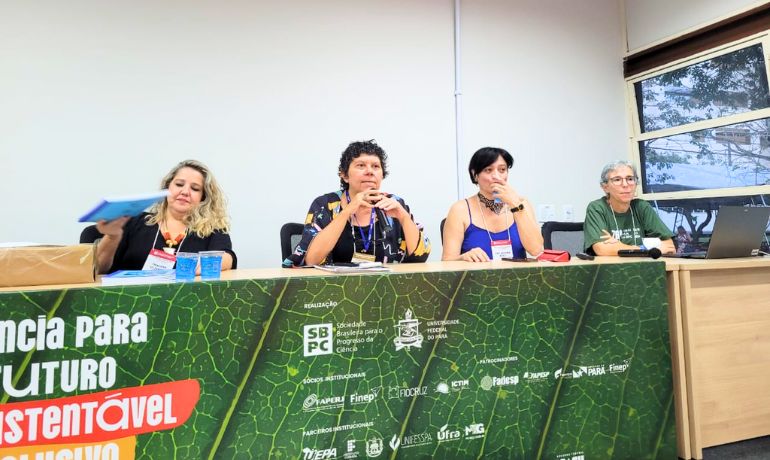Academic Thayan Oliveira (UFF) Some contents of the ABC book are displayed. Challenges and Strategies in Combating Misinformation At a round table at the 76th Annual Meeting of the SBPC, on 11/07. She was joined at the table by professors and researchers Ana Regina Barros Rego Leal (UFPI) and Luisa Massarani (Fiocruz/National Institute of Public Communications of Science and Technology INCT-CPCT).


The researcher explained that the concept of deception is Information that is intentionally provided to deceive.“People share misinformation not because they think it's true, but because it aligns with their beliefs.”
The scientist explained that misinformation is a form of Delegitimization Knowing the other. There is a dispute over scientific information. The malicious person distorts the information, appropriates scientific references and rhetoric to validate the misleading information.
Communication and Science
Communication has changed. Nowadays, it is done primarily through social networks, and 30% of Brazilians live in an information desertNo, according to the spokesperson. “The role of algorithms in the way we communicate today has changed everything. We need to understand our digital environment to work on it,” Oliveira noted.
on condition Science survives and develops only through disagreements.Real, in-depth scientific debate is healthy and keeps science moving forward. Oliveira highlighted pseudoscience, anti-science, denial, and Fake science Taking advantage of the contradictions inherent in the scientific process and treating them as inconsistencies, i.e. again, Sabotaging scientific information as a means of validating their harmful arguments.Q, which usually involves political disputes.
How to deal with misinformation?
The academic warned of The dire consequences of misinformation“There is a loss of knowledge of reality. We only know the truth when we have the data. So we Loss of knowledge sovereigntywhile these digital platforms gain more power.
She highlighted the importance of Training of qualified professionals To counter misinformation in their daily work practices, in addition to training Science education and dissemination centers from basic education onwards“Today we have people working in communication within a model that was successful in the 1990s. These professionals may still not be aware of the logic, strategies and languages typical of the digital environment – That is, they need to be updated. This is an important point. We need to recognize the importance of public communication of science, to create centers in universities and schools, to create agencies, to strengthen communication.
That speaker said Since 2019, public universities cannot open a communication competition.There is a decree that prevents the opening of competitions, they do not offer vacancies for communication professionals in all areas: video, radio, television, design, journalists, etc. . It does not fail, it deliberately “fails” because it is aware of the strategy. Meanwhile, on the other side, we have current politicians who invest heavily in communications.
Therefore, the academic warns against that. I need to restore employability to enhance public communication in scientific institutions.It is also necessary to acknowledge that there is a lack of knowledge about scientific misinformation, and there are many gaps that have not yet been resolved and this requires more investment in this area of information.
Oliveira suggests investing in Media Action Plan with Evidence Verification – Because scientists don't provide facts, they provide evidence. “We need to create Civil Society NetworkWhich increases our participation in the deliberative spaces of Congress and the Senate. Investing in science and technology is a condition of national sovereignty, and occupying these spaces and investing in public communication is also a matter of national information sovereignty.

“Wannabe internet buff. Future teen idol. Hardcore zombie guru. Gamer. Avid creator. Entrepreneur. Bacon ninja.”
